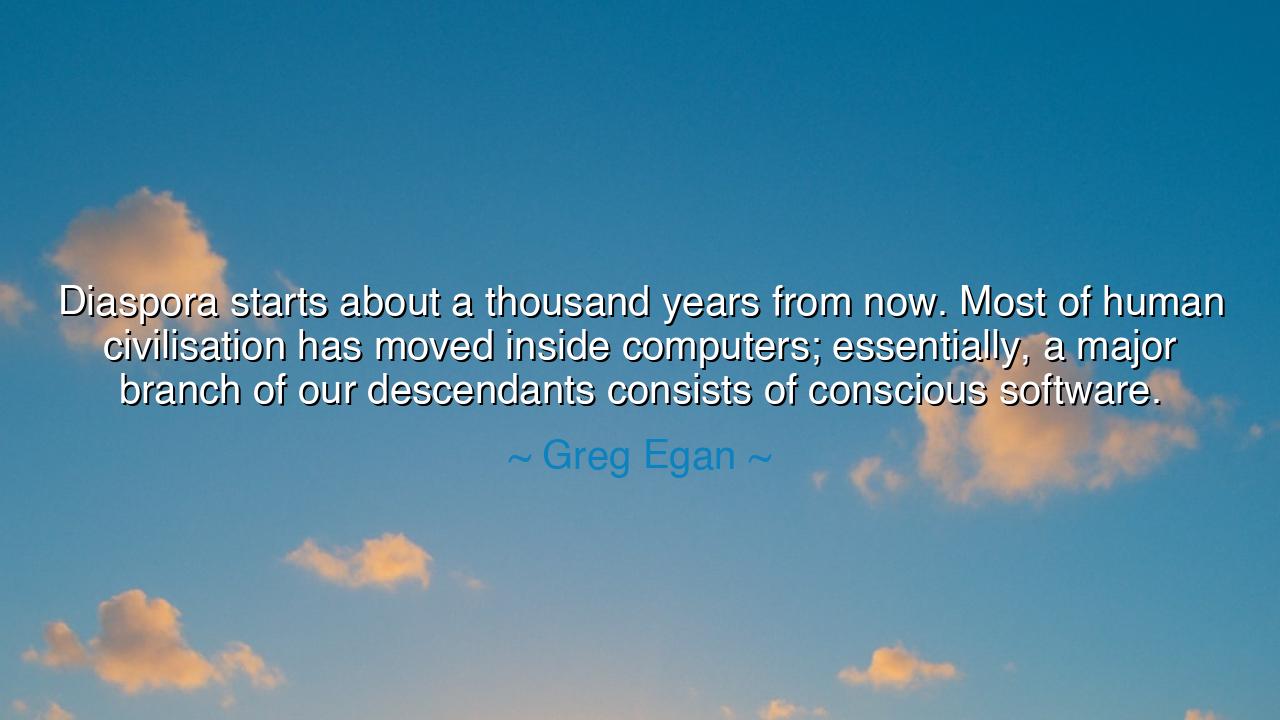
Diaspora starts about a thousand years from now. Most of human
Diaspora starts about a thousand years from now. Most of human civilisation has moved inside computers; essentially, a major branch of our descendants consists of conscious software.






In the deep, sacred halls of time, there are those rare words which resonate through the ages, speaking not only of the present but of a future that lies beyond the horizon of our imagination. One such utterance comes from the mind of Greg Egan, a visionary who speaks of a time so distant, it is as though he peers into the very fabric of the cosmos. “Diaspora starts about a thousand years from now. Most of human civilisation has moved inside computers; essentially, a major branch of our descendants consists of conscious software.” His words, though seemingly futuristic, carry with them the weight of deep contemplation on the direction of humanity and its destiny.
To understand the fullness of Egan’s prophecy, one must turn to the ancient seers who also sought to understand the unfolding of time. In Greek philosophy, the concept of progress was not linear, but cyclical. The cycles of the cosmos repeated themselves, the rise and fall of civilizations forever echoing in the vastness of existence. It is said that Heraclitus once remarked that, “You cannot step into the same river twice,” for the river, much like humanity, is always in flux. Egan’s words, though spoken in the language of technology, echo this ancient truth: the human condition is not static but is forever evolving, changing shape and form as time unfolds.
Consider the ancient civilizations of the Sumerians, who, through the invention of cuneiform, brought the first written language into the world. Their very act of recording their thoughts on clay tablets was a step into a new realm of existence—a realm where the physical world merged with the mental and immaterial. Though their technology was far from what we know today, they began the long journey of externalizing human consciousness, recording thoughts, stories, and knowledge to pass on to future generations. Egan’s vision is a continuation of this journey, where the written word gives way to an even greater transcendence: the human mind itself existing not in the fragile, decaying vessel of the body, but in the vast and infinite expanse of the digital world.
In the realm of ancient myth, we find stories of gods and mortals who, like us, grappled with the notion of immortality. The tale of Prometheus, who stole fire from the gods to give it to humanity, is perhaps one of the clearest examples. Prometheus’ gift was not just physical fire but the very spark of divinity—the knowledge that would lead humanity toward enlightenment, but also toward its eventual fall. Similarly, Egan’s conscious software is not simply the creation of a tool, but the birth of a new form of existence that could, one day, outlive the frailty of the human body. It is a rebirth, not in the biological sense, but in the metaphysical: the mind freed from the constraints of the flesh, reaching toward the stars.
In the great Roman Empire, as its vast territories stretched across continents, the Roman legions were tasked with spreading the empire's influence far and wide. The diaspora of Roman culture was profound—its language, its laws, its customs dispersed across the known world. Similarly, in the future that Egan imagines, humanity’s diaspora will not be spread across the earth, but across the vast reaches of cyberspace, living in digital environments, free from the confines of earthly geography. The great migration of human culture will no longer be of bodies, but of consciousness, moving from one digital realm to the next, creating civilizations that are unbound by the physical laws that govern our world today.
Yet, this new form of existence raises deep questions, much like those faced by the philosophers of old. In the writings of Plato, particularly in his Allegory of the Cave, there is the idea that the world we perceive is but a shadow of a greater truth. Similarly, in Egan's future, what does it mean to be human when the essence of consciousness is no longer tied to a physical form? Are we still ourselves when our thoughts, memories, and experiences live not in the brain but in software? Is immortality through the digital world a form of liberation, or does it risk severing us from the very humanity we seek to preserve?
The lesson of Egan’s prophecy is one of profound reflection: what is the essence of humanity if it can be separated from its body, its physical experiences, and its connection to the natural world? As we move ever closer to the world he envisions, we must ask ourselves how we, too, might continue the great journey of human evolution while retaining the core of what makes us human. We must consider the delicate balance between the advancements of technology and the preservation of the soul, the essence of what it means to live and to feel. The lesson is clear: progress should not come at the cost of humanity’s heart. We must remain grounded in our values, even as we venture into realms previously unimaginable.
So, let us take Egan’s vision not as a mere prophecy, but as a call to action. As we stand on the precipice of this brave new world, let us embrace the possibilities of conscious software and digital realms, but let us also remain mindful of the need to preserve what makes us truly human. Technology can extend our reach, but it should never replace the sacred connection we share with one another, and with the natural world. Just as the ancients sought to bridge the gap between the heavens and the earth, so must we seek to bridge the gap between the digital and the organic, forging a future that honors both the mind and the spirit.






AAdministratorAdministrator
Welcome, honored guests. Please leave a comment, we will respond soon